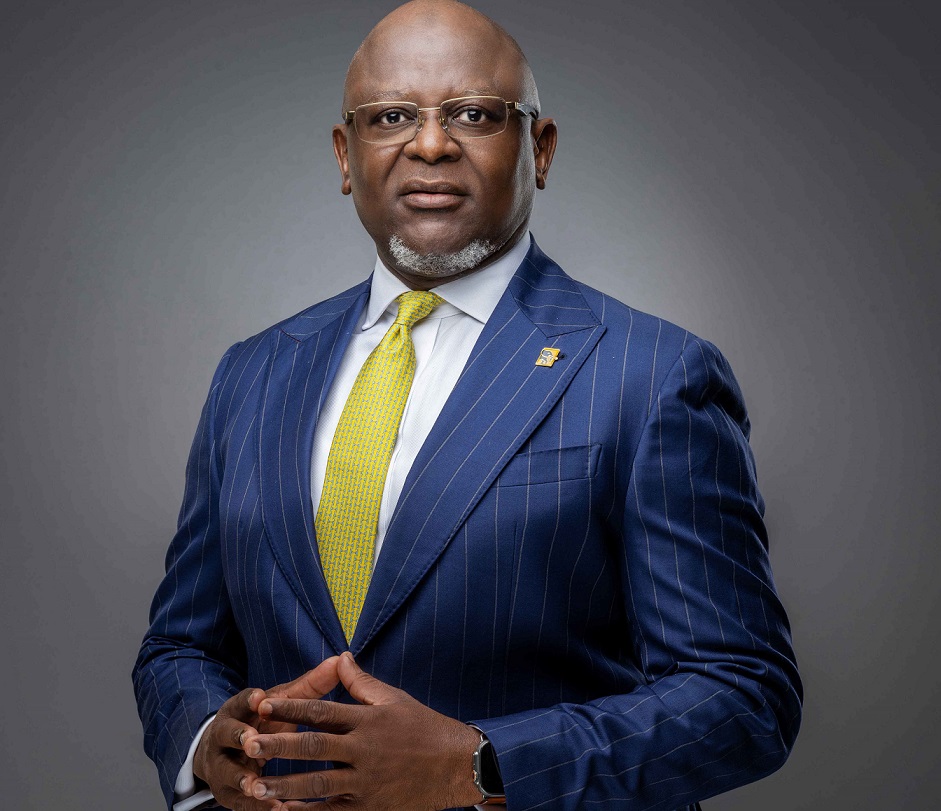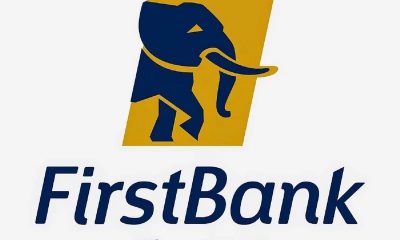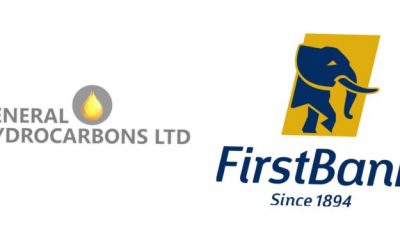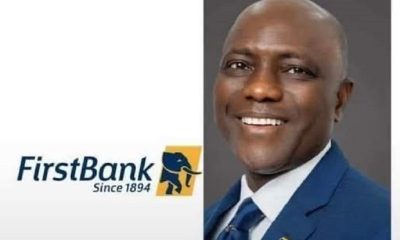Banking
Adesola Adeduntan’s led FirstBank: 130 years of Enabling Success

In a country with short-lived corporate excellence and a handful of centenary companies, hitting 130 years is undoubtedly a significant milestone for Nigeria’s premier financial institution, FirstBank. Experience, they say, comes with age. Nothing else aptly defines the consistent growth of First Bank of Nigeria Limited (FirstBank) and its consistent reinvention as the conscience of corporate Nigeria in the face of rising competition from traditional and other shadow banking brands.
Not many living Nigerians can list a single other existing Nigerian company founded in 1894, long before modern Nigeria was created. But FirstBank has not only survived the long 13 decades during which it etched itself into the socio-economic fabric of the country and created a niche as Nigeria’s banker, but it has also pushed itself into the frontier of financial technology evolution, making an inroad into the consciousness of tech-savvy Nigerian youths and the upwardly mobile banking public.
For an organization that has stuck to Nigeria through thick and thin and enjoyed the monopoly of banking the country from the cradle, long before Africa tasted the beauty of financial system evolution, FirstBank could have been a dinosaur. That would have been easy. But it has chosen the tougher option; challenging traditions, breaking new ground, and constantly refreshing its operational template to stay ahead of the curve.
Established in 1894 as British Bank of West Africa (BBWA) by the late Sir Alfred Lewis Jones, a shipping magnate, FirstBank has been at the forefront of Nigeria’s economic growth and development through its superior banking services and social investments across sectors – manufacturing, small and medium scale enterprise (SMEs), agriculture, oil and gas and just about every other sector that has contributed to the country’s economic discovery.
The history of FirstBank is the history of Nigeria. At some point in its history, it even served as Nigeria’s Central Bank. Today, as the undisputed leader of the country’s brick-and-mortar banking, its nearly 800 business locations across the country give it a robust presence in every local government across the nation.
Of course, in an era of ‘click’ banking, no financial institution is assessed by the strength of its physical banking network alone. Interestingly, the premier institution understands this logic, hence it has emerged as a force in continuously investing in cutting-edge financial technologies. For one, FirstMobile, its digital banking application, has also become a household name in the financial technology ecosystem. In 2015, when the platform was still in its infancy stage, its user base was about 60,000, a number that has soared to over six million (a growth of over 10,000%) as of last year. That has contributed immensely to its changed perception from a traditional bank to an innovative digital bank. Today, about 85 per cent of its transactions are initiated via digital platforms, according to insights provided by the bank in its public statements.
FirstMobile appears to have hit the bull’s eye in the bank’s reinvention drive and efforts to appeal to younger demographics. But the platform itself is only one of the potpourri of telecommunications-driven initiatives it has taken on to get young depositors on board. FirstOnline users have also grown from about 90,000 to over one million in less than a decade just as its USSD banking, which targets feature phone users, is even more successful with users increasing by close to 3,000 per cent in the last eight years, to about 15 million.
Last year alone, its Firstmonie Agent banking services processed over ₦1.1 trillion in transactions, more than double the amount handled by seven other big banks. Some of its strategic investments in technology include the development of its smart and interactive transaction banking platform known as FirstDirect2.0 and the introduction of the humanoid robot to the banking ecosystem in the country. The smart banking initiatives have been complemented by its Digital Xperience Centres (DXC) which are currently located in Lagos, Ibadan, and Abuja with plans to open more across the nation.
Overall, its digital banking has evolved in both volume and public perception even with artificial intelligence-driven commercials complementing its digital imprints. Ease, convenience and reliability created in recent years have moved the customer base from 0.6 million in 2015 to well over 42 million customer accounts as of 2023. This number, according to the Chief Executive Officer of FirstBank Group, Dr. Adesola Adeduntan, during an interview with The Guardian last year, would double in no distant future as the organization migrates aggressively to transaction-led banking. In September 2023 the bank’s non-interest income hit ₦293.0 billion, up 111.6% in comparison to September 2022 at ₦138.5 billion validating the bank’s commitment to a transaction-based era.
In addition, the number of users on the Bank’s digital channels has grown from about 600,000 users in 2015 to over 23.2 million users in 2023. On the back of the extensive technology infrastructure overhaul FirstBank embarked on under Adeduntan’s leadership, its digital banking channels have become the most dominant delivery channel with the percentage of customer-induced transactions processed via digital channels increased from about 20% to over 90%. FirstBank has equally been consistent in its profitability. Its Group profit before tax (PBT) has climbed steadily from 10 billion naira in 2015 to 362.24 billion naira in 2023.
For an organization that has not only created Nigeria’s banking industry but also dynamically shaped it, there is no reason the brand would not attract the best professionals. It attracted a blend of top Nigerian bankers and became the training ground for young professionals who have contributed to its rich history of corporate leadership. Despite this, Adeduntan who assumed office with a touch of dynamism, clearly understood the meeting point between institutional legacy and modern ‘click’ banking. In close to a decade since he first took over the reins at the Bank, he has brought this to bear, rejuvenating the rich corporate culture of the bank, competing actively in the youth space in both employment and business.
Nigerian banks have grown to become international brands, competing for businesses across Africa, (which they have dominated), Europe, Asia, and other Continents. With its United Kingdom subsidiary (which has a representative office in Paris, France) celebrating its 40th anniversary in 2022, FirstBank has led the revolution. Other subsidiaries of Nigeria’s premier financial inclusion services provider include FirstBank in the Democratic Republic of Congo, Guinea, Sierra Leone, and The Gambia; FBNBank in Ghana and Senegal as well as a Representative Office in Beijing, China.
Indeed, local banks have done well in recent years in opening offshore operations except that most of them are cost-centres, hence the promoters are often accused of ego-seeking and extroversion. And it is true because most of the subsidiaries’ operations have created a gaping hole in the bottom lines of the consolidated accounts of many of the institutions. But FirstBank turned the tide. In 2022, its overseas operations contributed a combined 21.3 per cent to the group’s pre-tax profit. Adeduntan has repositioned the financial institution from purely a Nigerian company to a multinational brand with an African focus but a Nigerian nucleus.
Beyond its name, it has recorded several firsts in the industry it single-handedly created. Some firsts include – the first to be listed on the stock exchange, the first – amongst the existing banks – to adopt the use of ATM and the first Nigerian bank – and second in Africa – to reach the 10 million ATM cards-issued milestone. In addition, FirstBank is leading in AI and robotics with regards to the deployment of Humanoid Robots, in the financial services space in Nigeria. The robots are equipped with Video Banking and Artificial Intelligence (AI), taking on the role of friendly branch staff. The financial institution is the first to foray into arts, food, music, and other lifestyle sponsorships as part of the brand value proposition for clients of all ages.
Speaking on the resilience of the bank at a recent function Adeduntan disclosed what he called the bank’s secret of success: “At FirstBank, our purpose is to enable success, putting our customers and stakeholders at the heart of our business. “For the years of our existence, we have focused on providing excellent financial services to meet the needs of our esteemed customers. We continue to improve on our products and create new ones that suit their specific needs. The reason why we have been successful is our ability to invent and reinvent ourselves. You can only be successful like that when you make your customer the centre point of all your actions. That is the secret of our success.” The bank has demonstrated it is a responsible corporate citizen, playing a catalytic role in the economic and social development of the country. FirstBank’s sustainability/ESG focus and commitments are in three key areas: Responsible Lending, Procurement & Climate Performance; Financial Inclusion & Diversity; as well as Education, Health, and Welfare.
Customers of the financial institution remain a vital element of its business. So, the bank constantly seeks responsible ways to provide lending and investment products and services that meet the customers’ needs, while ensuring that it manages the environmental social and governance (ESG) impacts in the process thus contributing to and promoting overall sustainable growth and development. About N5 Trillion worth of transactions were screened for ESG risks in 2023. The bank has shown its commitment to playing a key role in the transition to a global net-zero economy by decarbonising its operations and value chains, driving climate finance, and promoting climate thought leadership. For example, its partnership with Nigeria Conservation Foundation has seen the financial giant begin 50,000 tree planting with this year 2024 set as the target year for this audacious goal.
FirstBank’s community development initiatives are anchored on its strategic Education, Health, and Welfare pillars. In 2023 alone, FirstBank executed various projects under the Start Performing Acts of Random Kindness (SPARK) initiative with growing impacts across 8 countries, including 60 beneficiary schools with over 150,000 secondary school students, and 30,000 underprivileged people and widows; over N100,000,000 (one hundred million naira) donations covering books and infrastructure for students, food items and clothing for the underprivileged, provision of capital for small and micro businesses.
Its FutureFirst programme in partnership with Junior Achievers Nigeria (JAN) has impacted over 1,000,000 (one million) people across the regions of the country including Lagos, Port Harcourt, and Abuja with the knowledge of financial literacy and entrepreneurship. It has also strategically driven partnerships with over 100 Charities/NGOs including LEAP Africa; International Women Society; UNGC; UN Women; and Junior Achievement Nigeria. Following the COVID-19 lockdown, FirstBank stepped in to donate cash (over 1 billion naira) and food to support the government in the fight against the pandemic. It also provided an innovative e-learning initiative enabling the education of one million Nigerian students to drive sustainable efforts towards improving education for all. In partnership with the Lagos State Employment Trust Fund (LSETF), it launched a N5 billion LSETF-First Edu Loan scheme to cushion the impact of the COVID-19 pandemic on low-cost private schools in Lagos State.
For 30 years, FirstBank has remained a sponsor of the annual Nigerian Economic Summit, organized by the Nigerian Economic Summit Group, a think tank group with a mandate to promote and champion the transformation of the Nigerian economy into a private sector-led economy. It is known for other sponsorships including, the Kaduna Georgian Cup Polo Tournament, now in its 103rd year, which is perhaps the longest-standing sports sponsorship in the world. FirstBank is also a long-standing sponsor of the Lagos Amateur Open Golf Championship at the Ikoyi Club, a property it has faithfully sponsored for 62 years.
The bank has played a crucial role in empowering entrepreneurs, women, students and the rapidly growing creative industries locally, which are gaining global recognition. Its strategic interventions through DecemberIssaVybe, FirstGem, SPARK, FirstBank Women Network and numerous other campaigns have been impactful, especially in addressing some key United Nations Sustainable Development Goals (SDGs).
FirstBank has demonstrated its commitment to Diversity through policies, partnerships, and initiatives, such as its employees’ ratio of female to male (39 percent:61 percent); 32 percent women in management, and 11 women on the Board of Directors across the FirstBank Group as well as various initiatives aimed at addressing the gender gap and increasing participation of women at all levels within the organization.
In addition, the Bank’s membership of the UN Women is an affirmation of a deliberate policy that is consistent with UN Women’s Women Empowerment Principles – Equal Opportunity, Inclusion, and Non-discrimination. And there have been rewards via awards for its leadership and life-changing initiatives. The recent ones include Best Corporate Bank at the recent Euromoney Awards for Excellence, Nigeria 2023; Best Corporate Bank Western Africa 2023, by Global Banking and Finance; Best Internet Banking in Nigeria 2023, by International Business Awards; Most Innovative Banking Brand in Nigeria, by Global Brands Awards; the Financial Institution of the Year 2023, by Afreximbank Pan-African Business and Development; Best CSR Bank Western Africa 2023 by Global Banking and Finance Magazine; Market Leader Nigeria in ESG – Euromoney Market Leaders 2022. For six consecutive years (2011 – 2016), FirstBank was named ‘Most Valuable Bank Brand in Nigeria’ by The Banker Magazine of the Financial Times Group and ‘the Best Retail Bank in Nigeria’ from 2011 to 2018, an award of the Asian Banker International Excellence in Retail Financial Services Awards.
At the heart of FirstBank’s success story – which includes enabling the success stories of its customers and other stakeholders – lies its ability to continuously reinvent itself. And the reinvention seems to have started in earnest. For instance, its stock soared recently, pushing the Group into the exclusive club of stocks with over one trillion (SWOOT) capitalization. A few months after the remarkable feat, it went, shoving other lenders aside to reclaim the most capitalized banking stock on the stock exchange.
It has been 13 decades of rising and growing with Nigeria. But FirstBank is not slowing down in its journey with the country its operation pre-dated.
Banking
All Set for Second HerFidelity Apprenticeship Programme

By Modupe Gbadeyanka
Registration for the second HerFidelity Apprenticeship Programme (HAP 2.0) organised by Fidelity Bank Plc has commenced.
The Divisional Head of Product Development at Fidelity Bank, Mr Osita Ede, informed newsmen that the initiative was designed to empower women with sustainable entrepreneurship skills.
The lender created the flagship women-empowerment initiative to equip women with practical, income‑generating skills and structured pathways to entrepreneurship.
“HerFidelity Apprenticeship Programme 2.0 reflects our commitment to continuous improvement. Having evaluated feedback from the first edition, we have returned with stronger partnerships and deeper mentorship programmes to ensure that women acquire not just skills, but sustainable economic opportunities,” he said.
“At the heart of the programme is guided, real‑world learning. Participants will undergo intensive apprenticeship training under reputable institutions and industry experts across select fields such as hair styling, shoe making, auto mechatronics, and interior decoration,” Mr Ede added.
He noted that HerFidelity Apprenticeship Programme 2.0 goes beyond skills acquisition by offering participants a wide range of business advisory services. These include business and financial literacy training, mentorship support throughout the apprenticeship journey, access to Fidelity Bank’s women‑focused and SME financial solutions, as well as guidance on business formalisation and growth strategies.
Further emphasising the bank’s vision, Mr Ede said, “By integrating structured mentorship with entrepreneurial development, Fidelity Bank is positioning women not just as trainees, but as future employers, innovators, and economic contributors within their communities. This aligns with our mandate to help individuals grow, businesses thrive, and economies prosper.”
Banking
The Alternative Bank Opens New Branch in Ondo

By Modupe Gbadeyanka
A new branch of The Alternative Bank (AltBank) has been opened in Ondo State as part of the expansion drive of the financial institution.
A statement from the company disclosed that the new branch would support export-oriented agribusinesses through Letters of Credit and commodity-backed trade finance, ensuring that local producers can scale beyond state borders.
For SMEs, the bank is introducing robust payment rails, asset financing for equipment and inventory, and supply chain-backed facilities that strengthen working capital without trapping businesses in interest-based debt cycles.
The Governor of Ondo State, Mr Lucky Aiyedatiwa, represented by his Chief of
Staff, Mr Olusegun Omojuwa, at the commissioning of the branch, underscored the importance of financial institutions in economic development.
“The pivotal role of financial institutions to economic growth and development of any economy cannot be overemphasised. It provides access to capital, supporting small and medium-scale enterprises and encouraging savings.
“Therefore, I have no doubt in my mind that the presence of The Alternative Bank in Ondo State will deepen financial services, create employment opportunities and stimulate economic activities across various sectors,” he said.
In her remarks, the Executive Director for Commercial and Institutional Banking (Lagos and South West) at The Alternative Bank, Mrs Korede Demola-Adeniyi, commended the state government’s leadership and outlined the lender’s long-term vision for Ondo State.
“As Ondo State steps into its next fifty years, and into the future anchored on the sustainable development championed during the recent anniversary celebrations, The Alternative Bank is here to be the financial engine for that vision. We didn’t come to Akure to hang banners. We came to fund work, farms, shops, and factories.”
With Ondo State’s economy anchored largely on agriculture, particularly cocoa production, poultry farming, and other cash crops, alongside a growing SME and trade ecosystem, AltBank is deploying sector-specific financing solutions tailored to these strengths.
For cocoa aggregators, processors and poultry operators, the bank will provide production financing, facility expansion support, machinery lease structures, and structured trade facilities under its joint venture and cost-plus financing models, with transaction cycles of up to 180 days for commodity trades and longer-term structured asset financing for equipment and infrastructure.
The organisation is a notable national non-interest bank with a physical network now surpassing 170 locations, deploying capital to solve real-world challenges through initiatives such as the Mata Zalla project, which saw to the training of hundreds of women as electric tricycle drivers and mechanics.
Banking
Recapitalisation: 20 Nigerian Banks Now Fully Compliant—Cardoso

By Adedapo Adesanya
The Governor of the Central Bank of Nigeria (CBN), Mr Yemi Cardoso, announced on Tuesday that the country’s banking sector is making strong progress in the recapitalisation drive, with 20 banks now fully compliant.
Mr Cardoso disclosed this during a press conference at the first Monetary Policy Committee (MPC) meeting of 2026, where he also highlighted positive developments in the nation’s foreign reserves.
On March 28, 2024, the apex bank announced an increase in the minimum capital requirements for commercial banks with international licences to N500 billion.
National and regional financial institutions’ capital bases were pegged at N200 billion and N50 billion, respectively.
Also, CBN raised the merchant bank minimum capital requirement to N50 billion for national licence holders.
The banking regulator said the new capital base for national and regional non-interest banks is N20 billion and N10 billion, respectively.
To meet the minimum capital requirements, CBN advised banks to consider the injection of “fresh equity capital through private placements, rights issue and/or offer for subscription”.
Following the development, several banks announced plans to raise funds through share and bond issuances.
In January, Zenith Bank said it had raised N350.46 billion through rights issue and public offer to meet the CBN minimum capital requirement.
Guaranty Trust Holding Company Plc (GTCO), on July 4, said it had successfully priced its fully marketed offering on the London Stock Exchange (LSE).
In September, the CBN governor said 14 banks fully met their recapitalisation requirements — up from eight banks in July.
With one month to the central bank’s March 31, 2026, recapitalisation deadline, 13 Nigerian lenders are yet to cross the finish line.
Additionally, the governor noted that 33 banks have raised funds as part of the ongoing recapitalisation exercise, signalling robust capital mobilisation across the sector.
He stated that gross foreign reserves have climbed to a 13-year high of $50.4 billion as of mid-February 2026.
-

 Feature/OPED6 years ago
Feature/OPED6 years agoDavos was Different this year
-
Travel/Tourism10 years ago
Lagos Seals Western Lodge Hotel In Ikorodu
-

 Showbiz3 years ago
Showbiz3 years agoEstranged Lover Releases Videos of Empress Njamah Bathing
-

 Banking8 years ago
Banking8 years agoSort Codes of GTBank Branches in Nigeria
-

 Economy3 years ago
Economy3 years agoSubsidy Removal: CNG at N130 Per Litre Cheaper Than Petrol—IPMAN
-

 Banking3 years ago
Banking3 years agoSort Codes of UBA Branches in Nigeria
-

 Banking3 years ago
Banking3 years agoFirst Bank Announces Planned Downtime
-

 Sports3 years ago
Sports3 years agoHighest Paid Nigerian Footballer – How Much Do Nigerian Footballers Earn






















